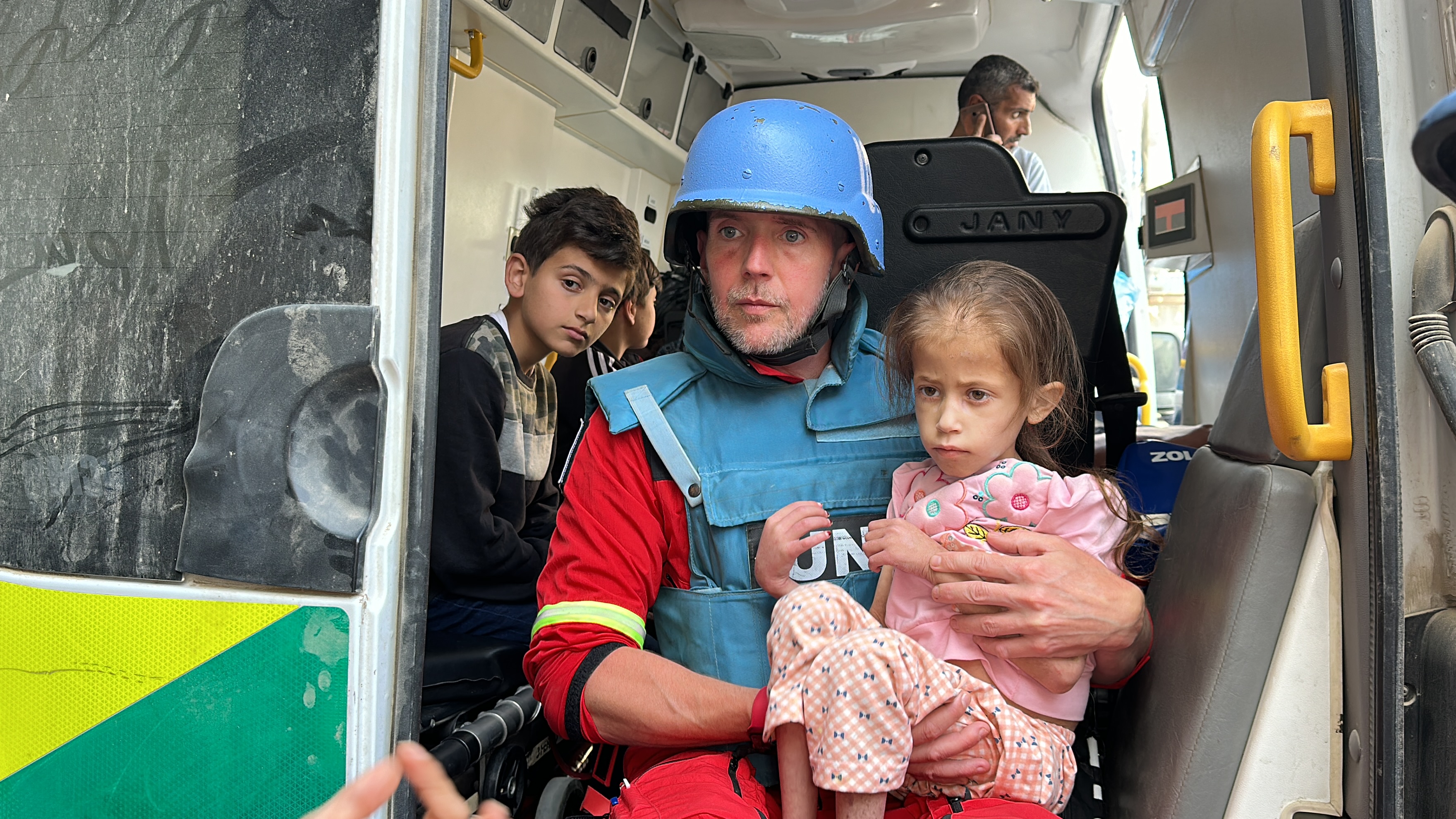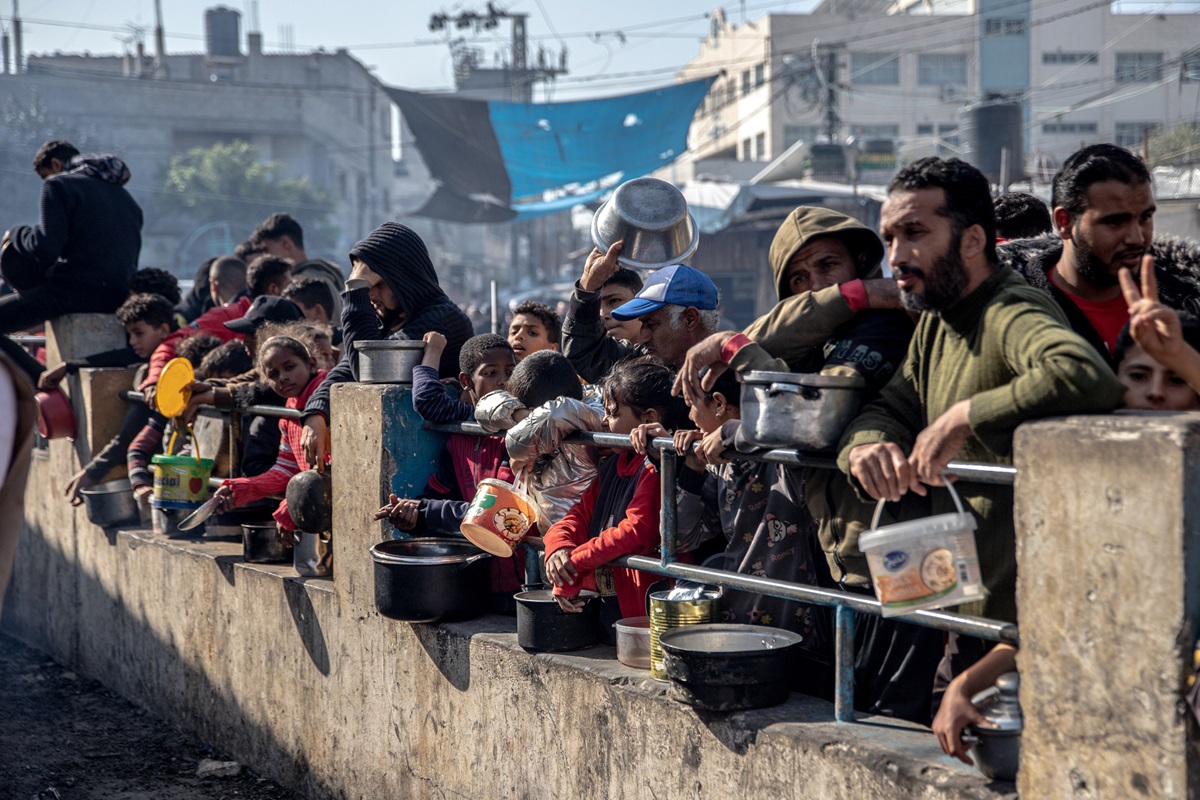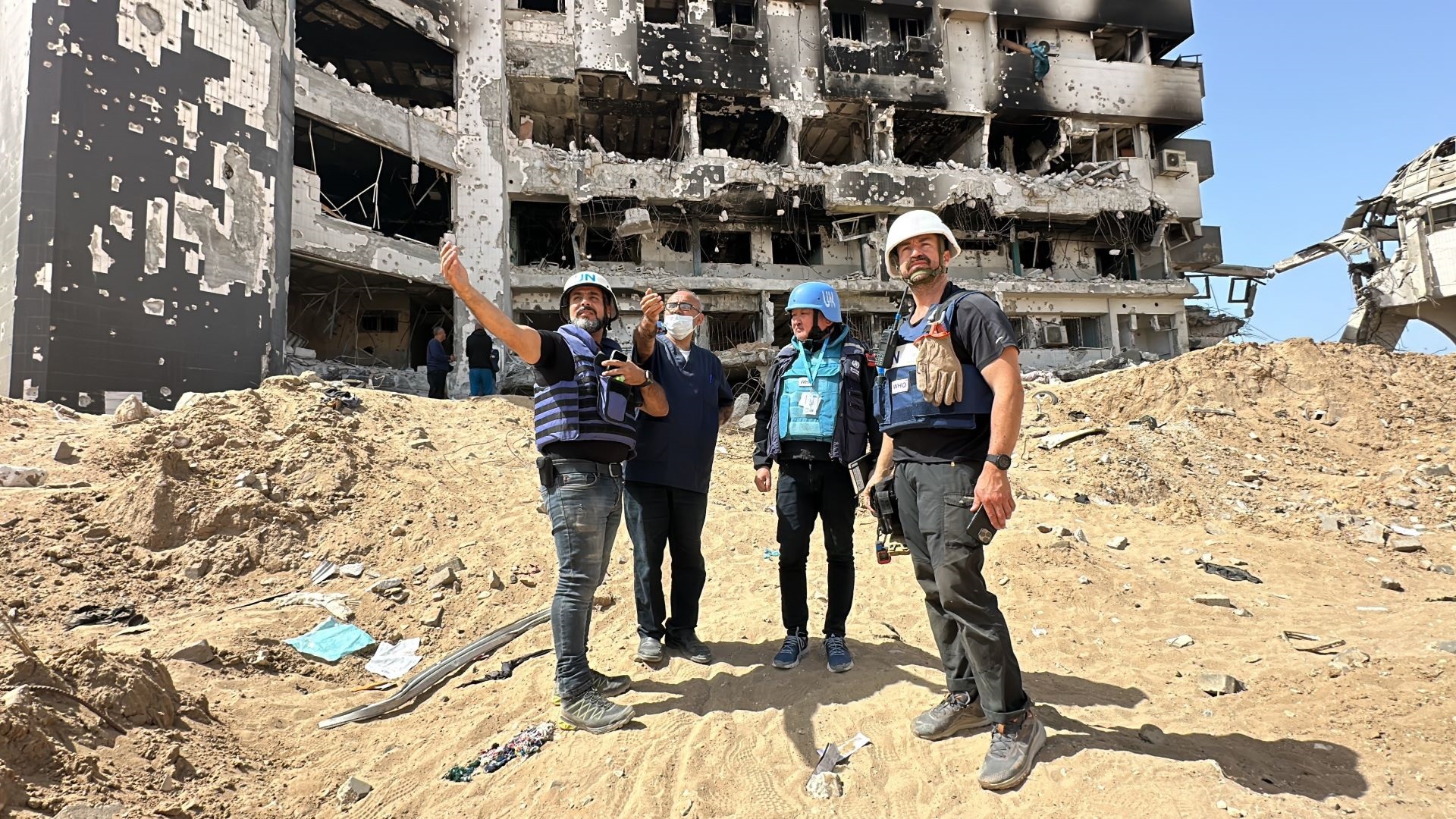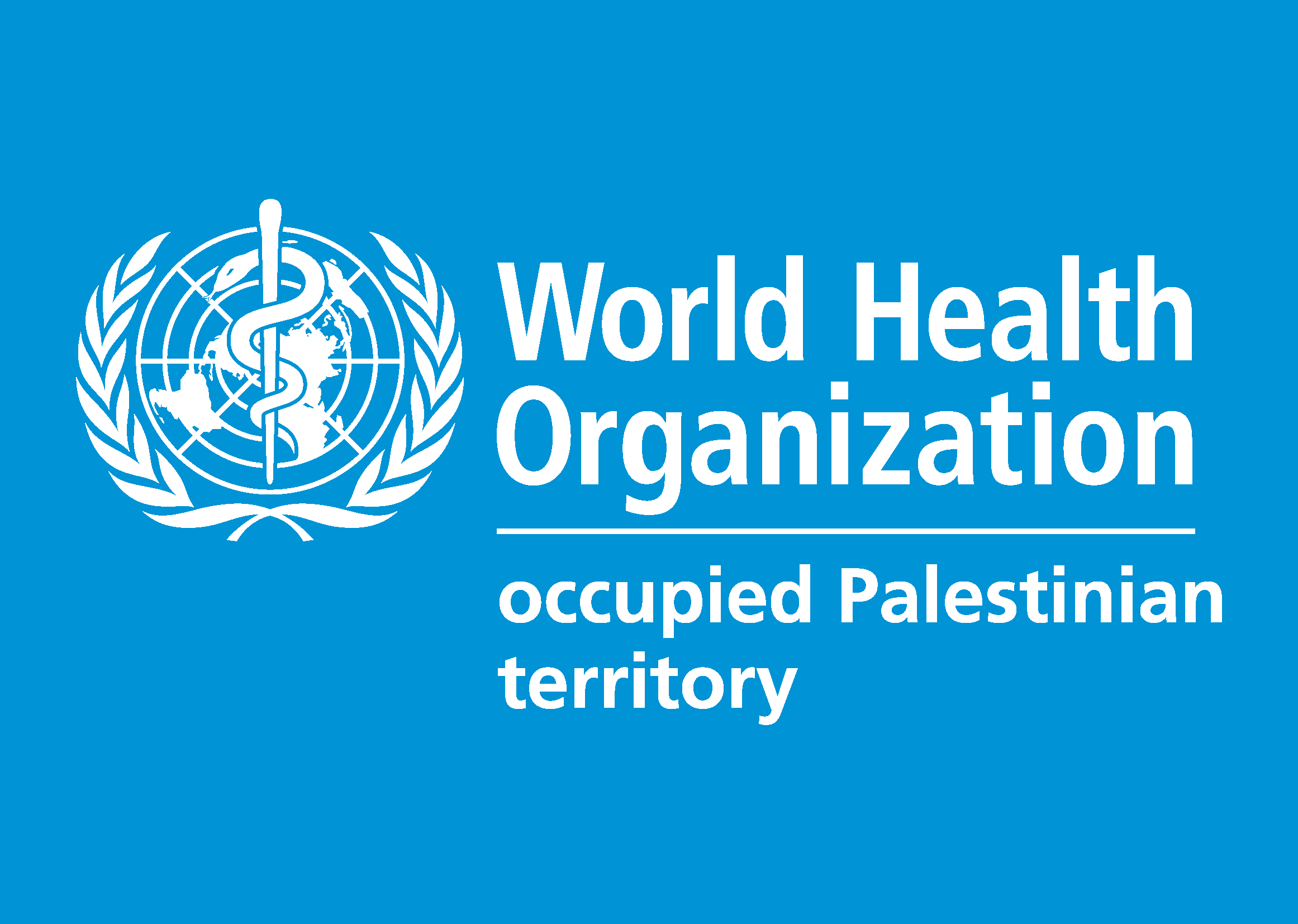‘I am terrified of losing my daughter’

‘I am terrified of losing my daughter’
As people of Gaza face catastrophic hunger, WHO, with support from European Union, is ensuring that nutrition stabilization centers are equipped to treat cases of severe acute malnutrition.
GAZA, OCCUPIED PALESTINIAN TERRITORY, 19 APRIL 2024 -“My daughter is my life; she was like a flower. Now I can see her ribs and her spine. She can’t even sit, I have to carry her to the toilet,” says Nesma Ayyad, mother of seven-year-old Jana.
Nesma has been alone in Gaza since the war began in October. Her husband had left the Strip for medical treatment and was unable to return home as borders closed and the conflict worsened. With their family home destroyed during a bombing, she has struggled to provide for her four children and keep them safe.
Jana, whom she describes as an active young girl full of life, began suffering from stomach aches, diarrhea, and weight loss due to dire shortages of food and safe water. By February, her condition had deteriorated to the point where she was admitted to Kamal Adwan Hospital in north Gaza due to complications arising from dehydration and severe acute malnutrition.
"The doctor told me she needs nutritious food that I could not provide. I am terrified of losing my Jana,” says Nesma.
Jana’s story is tragically all too familiar. With famine looming, more than half of all Palestinians in Gaza – 1.1 million people – and are facing catastrophic hunger. Twenty-eight patients have reportedly died due to malnutrition, and many are fighting for their life.
Since the onset of hostilities, agricultural and agrifood production in Gaza has collapsed. Currently, about 81% of Gaza households lack access to clean and safe water, with internally displaced persons among the most affected.
Gaza has been reduced to rubble and urgently requires the revival of its local food production to help prevent famine and malnutrition – and this needs the entry of food production and agricultural inputs. With traditional food sources disrupted, humanitarian assistance has become the primary means of survival. To address the population's dire needs, an immediate humanitarian ceasefire, opening of all border crossings, and sustained aid access are crucial, along with the availability of basic goods from the private sector.
WHO, together with its partners, is racing against time to save lives.
Three WHO-supported nutrition stabilization centers are currently operational in hospitals and medical centers in Gaza - two in the south and one in the north of the Strip. With crucial support from the European Union, WHO has supplied these centers with medical supplies for the treatment of up to 1250 children with severe acute malnutrition. Additionally, WHO has trained health workers to identify and treat malnutrition with complications.
Jana’s condition is still critical. After receiving initial treatment at the nutrition stabilization center at Kamal Adwan, she has been transferred by WHO with assistance from CADUS, an international emergency team, to a field hospital in Rafah. She is currently awaiting approval for medical evacuation outside Gaza to continue her treatment.
"I am truly happy that she’s finally going to be able to receive treatment abroad. I hope that day comes soon, says Nesma. “I hope my child comes back healthy as she was before.”
Famine in Gaza is imminent, with immediate and long-term health consequences

18 March 2024, The latest analysis from the Integrated Food Security Phase Classification (IPC) partnership released today warns that the situation in Gaza is catastrophic, with northern Gaza facing imminent famine and the rest of the Strip at risk as well.
"The IPC announcement reflects the dire situation that the people of Gaza are facing," said WHO Director-General Dr Tedros Adhanom Ghebreyesus. "Before this crisis, there was enough food in Gaza to feed the population. Malnutrition was a rare occurrence. Now, people are dying, and many more are sick. Over a million people are expected to face catastrophic hunger unless significantly more food is allowed to enter Gaza."
Before the recent months’ hostilities, 0.8% of children under 5 years of age were acutely malnourished. Today’s report shows that as of February in the northern governorates, that figure is between 12.4 and 16.5%.
Without a significant and immediate increase in deliveries of food, water and other essential supplies, conditions will continue deteriorating. Virtually all households are already skipping meals every day and adults are reducing their meals so that children can eat.
The current situation will have long-term effects on the lives and health of thousands. Right now, children are dying from the combined effects of malnutrition and disease. Malnutrition makes people more vulnerable to getting severely ill, experiencing slow recovery, or dying when they are infected with a disease. The long-term effects of malnutrition, low consumption of nutrient-rich foods, repeated infections, and lack of hygiene and sanitation services slow children’s overall growth. This compromises the health and well-being of an entire future generation.
WHO and partners have been carrying out high-risk missions to deliver medicines, fuel and food for health workers and their patients, but our requests to deliver supplies are often blocked or refused. Damaged roads and continuous fighting, including in and close to hospitals, mean deliveries are few and slow.
The IPC report confirms what we, our UN partners and nongovernmental organizations (NGOs) have been witnessing and reporting for months. When our missions reach hospitals, we meet exhausted and hungry health workers who ask us for food and water. We see patients trying to recover from life-saving surgeries and losses of limbs, or sick with cancer or diabetes, mothers who have just given birth, or newborn babies, all suffering from hunger and the diseases that stalk it.
WHO, as a partner of the Nutrition Cluster, is currently supporting a nutrition stabilization center in Rafah to treat children with severe acute malnutrition with medical complications, who are at the highest risk of imminent death if not urgently treated. We are supporting the establishment of two additional centres: one in the north of Gaza at Kamal Adwan hospital and one at the International Medical Corps field hospital in Rafah. WHO is supporting the pediatric wards of Al-Aqsa and Al-Najjar hospitals through the provision of nutrition supplies and medicines as well as training of medical personnel, and the promotion of appropriate infant and young child feeding practices, including breastfeeding.
WHO has trained health workers on how to recognize and treat malnutrition with complications. WHO is supporting hospitals and the centers with medical supplies for the children being treated.
Further nutrition and stabilization centres need to be added in all key hospitals in Gaza. Communities themselves will need the support to scale up the management of malnutrition locally.
WHO and other UN partners again ask Israel to open more crossings and accelerate the entry and delivery of water, food, medical supplies and other humanitarian aid into and within Gaza. As the occupying force, it is their responsibility under international law to allow for the passage of supplies including food. Recent efforts to deliver by air and sea are welcome, but only the expansion of land-crossings will enable large-scale deliveries to prevent famine. The time to act is now.
###
Note to editors
The Integrated Food Security Phase Classification (IPC) is a multi-partner initiative for improving food security and nutrition analysis and decision-making. By using the IPC classification and analytical approach, governments, UN Agencies, NGOs, civil society and other relevant actors, work together to determine the severity and magnitude of acute and chronic food insecurity, and acute malnutrition situations in a country, according to internationally recognized standards.
As a member of the IPC partnership, WHO provided technical expertise and information on the health situation for this evaluation. The conflict is posing extreme limitations to the ability to deliver life-saving health assistance to the population. In February 2024, attacks against health-care facilities, infrastructures and services continued, resulting in 58% of the hospitals not functioning in Gaza, especially in the Northern governorates (75% of the hospitals not functioning). According to the Health Cluster, as of 5 March 2024, only 2 hospitals and no Primary Health Care Centres were fully functioning. Acute respiratory infections and diarrheal diseases are rampant among children under five, exposing them to high-risk nutritional deterioration.
The full recommendations from the IPC
Famine can be halted—both in the immediate term and it requires urgent and proactive measures from parties to the conflict and the international community. They must immediately curb the rapidly escalating hunger crisis in the Gaza Strip, garner political support to put an end to the hostilities, mobilize necessary resources and ensure the safe delivery of humanitarian aid to the people of Gaza.
Overall recommendations
- Restore humanitarian access to the entire Gaza Strip.
- Stop the fast-paced deterioration of the food security, health and nutrition situation leading to excess mortality through: the restoration of health, nutrition, and WASH services and the protection of civilians; and the provision of safe, nutritious, and sufficient food to all the population in need.
- The sustained supply of sufficient aid commodities, including but not limited to food, medicines, specialist nutrition products, fuel, and other necessities should be allowed to enter and move throughout the entire Gaza Strip by road. Traffic of commercial goods should also be fully resumed to meet the volume of commodities required.
Six months of war leave Al-Shifa hospital in ruins, WHO mission reports

6 April 2024 - A WHO-led multi-agency mission accessed Al-Shifa Hospital in north Gaza on 5 April to conduct a preliminary assessment of the extent of destruction and identify needs to guide future efforts to restore the facility. The highly complex mission was conducted in close partnership with the United Nations Office for the Coordination of Humanitarian Affairs (OCHA), United Nations Mine Action Service (UNMAS), United Nations Department for Safety and Security (UNDSS), and in collaboration with the acting Hospital Director.
Prior to the mission, WHO’s efforts to reach the hospital to medically evacuate patients and staff and conduct an assessment were denied, delayed or impeded 6 times between 25 March and 1 April.
Like the majority of the north, Al-Shifa Hospital – once the largest and most important referral hospital in Gaza – is now an empty shell after the latest siege. No patients remain at the facility. Most of the buildings are extensively damaged or destroyed and the majority of equipment is unusable or reduced to ashes. The WHO team said that the scale of devastation has left the facility completely non-functional, further reducing access to life-saving health care in Gaza. Restoring even minimal functionality in the short term seems implausible and will require substantial efforts to assess and clear the grounds for unexploded ordnance to ensure safety and accessibility for partners to bring in equipment and supplies.
The hospital’s emergency department, surgical, and maternity ward buildings are extensively damaged due to explosives and fire. The western wall of the emergency department and northern wall of the neonatal intensive care department (NICU) have been torn down. At least 115 beds in what once was the emergency department have been burnt and 14 incubators in the NICU destroyed, among other assets. An in-depth assessment by a team of engineers is needed to determine if these buildings are safe for future use.
The hospital's oxygen plant has been destroyed, leaving Kamal Adwan Hospital as the only source of medical oxygen production in the north. Further comprehensive assessment is essential to evaluate the functionality of vital equipment such as CT scanners, ventilators, sterilization devices, and surgical equipment, including surgical tools and anaesthesia devices. The current situation has left north Gaza without CT scanning capabilities and significantly diminished laboratory capacity, severely compromising effective diagnosis, which will increase avoidable deaths.
Numerous shallow graves have been dug just outside the emergency department, and the administrative and surgical buildings. In the same area, many dead bodies were partially buried with their limbs visible. During the visit, WHO staff witnessed at least 5 bodies lying partially covered on the ground, exposed to the heat. The team reported a pungent smell of decomposing bodies engulfing the hospital compound. Safeguarding dignity, even in death, is an indispensable act of humanity.
According to the acting Hospital Director, patients were held in abysmal conditions during the siege. They endured severe lack of food, water, health care, hygiene and sanitation, and were forced to relocate between buildings at gun point. At least 20 patients have reportedly died due to the lack of access to care and limited movement authorized for health personnel.
Despite deconfliction, yesterday’s mission faced significant delays at the military checkpoint en route to Al-Shifa Hospital. On the same day, another WHO-led mission bound for Al-Awda and Kamal Adwan hospitals in northern Gaza – to deliver medical supplies, fuel, deploy emergency medical teams, and support referral of critical patients – encountered unnecessary delays, including the detention of a supply truck driver who was part of the convoy. He was detained for over an hour at a separate location, out of view of the mission team. Eventually this mission was aborted due to safety concerns as the delays left insufficient time for safe completion and return before nightfall.
Between mid-October and end March, over half of all WHO missions have been denied, delayed, impeded or postponed. As health needs soar, the lack of a functional deconfliction system is a major obstacle in delivering humanitarian aid – including medical supplies, fuel, food and water to hospitals – anywhere close to the scale needed.
Six months – half a year – into the war, the destruction of Al-Shifa Hospital and Nasser Medical Complex has broken the backbone of the already ailing health system. Prior to the latest siege, WHO and partners had supported the revival of basic services at Al-Shifa Hospital, and Nasser Medical Complex was regularly supplied to continue serving as the main hospital in south Gaza. These efforts are now lost.
As WHO marks World Health Day tomorrow, under the theme “My health, my right”, this basic right is utterly out of reach for the civilians of Gaza. Access to health care in Gaza has become totally inadequate, and the ability of WHO and partners to help is constantly disrupted and impeded.
Of the 36 main hospitals that used to serve over 2 million Gazans, only 10 remain somewhat functional, with severe limitations on the types of services they can deliver. The proposed military incursion into Rafah can only result in further diminution of access to health care and would have unimaginable health consequences. The systematic dismantling of health care must end.
WHO repeats its calls for the protection of patients, health and humanitarian workers, health infrastructure, and civilians. Hospitals must not be militarized, misused, or attacked. WHO demands an effective, transparent and workable deconfliction mechanism, and safety guarantees, ensuring that the movement of aid within Gaza, including through checkpoints, is safe, predictable and expedited. WHO calls for additional land crossings to allow access into and across Gaza more safely and directly.
As famine looms, disease outbreaks spread, and traumatic injuries increase, WHO calls for unimpeded access of humanitarian aid into and across the Gaza Strip, and a lasting ceasefire.
France and the UN join hands to strengthen maternal and neonatal health services in the Gaza Strip and the West Bank

In the framework of France’s efforts to support the civilian population in Gaza and more particularly women and children, who are the first victims of this conflict.
EAST JERUSALEM, 16 April 2024 – France, through the French Development Agency (AFD), UNICEF, UNFPA and WHO will continue supporting the health system in the State of Palestine, with a particular focus on addressing the acute crisis in the Gaza Strip caused by the ongoing hostilities. The agreement, signed today in the Prime Minister Office in Ramallah by the General Consul of France in Jerusalem, M. Nicolas Kassianides, AFD Country Director, Mrs. Véronique Sauvat, and the UNICEF Special Representative to the State of Palestine, Ms. Jean Gough, increases the support already received from France, through AFD, of € 9 million, for a total of € 19,9 million.
This is a concrete translation of the 100 million euros support that was announced by France during the Paris humanitarian conference on 9 November 2023, convened by the French President. The delivery of health services, in particular to women and children who are the first victims of the conflict, is at the core of this effort. Indeed, the ongoing escalation of hostilities in the Gaza Strip continues to have severe health consequences, especially for women and children. Access to healthcare remains disrupted, leading to malnutrition among children. Women face challenges in accessing maternal health services and limited access to food, medicines, water and sanitation services amplify health risks. This programme is a continuation of an existing initiative, supported by AFD, which focused on restoring and strengthening sexual, reproductive, maternal, neonatal, children and adolescents' health (SRMNCH) services, while also strengthening emergency response mechanisms, providing maternity equipment and replenishing stocks of medicines and supplies vital to the operation of health centers, particularly in the Gaza Strip. Additionally, the programme focuses on further supporting and strengthening health centers and reproductive, maternal, neonatal, and infant (RMNI) services by supporting healthcare staff including midwives. The programme aims at reducing gender inequalities in health care provision and addressing specific needs of women and girls in accessing services, particularly in crisis and post-crisis contexts. While most activities will support children in the Gaza Strip, the West Bank will also be included in the programme to address the consequences of the crisis in the Gaza Strip.
This collaboration aims at improving access to health services for the population reaching more than 145,000 people both in the context of the crisis and in the long-term striving to deliver on transformative changes for the benefit of the most vulnerable groups and particularly now where the population faces unprecedented and unparalleled challenges.
In the framework of the previous phase of this project, 504,700 women (108,500) and children (396,200) in the Gaza Strip were provided with improved access to gender sensitive SRMNCH services, through the renovation of six hospitals and primary centers in Khan Younes and health training of around 7.000 persons. In the framework of the conflict, the emergency component of the project was used to provide medical supplies to treat 1,600 trauma patients, postpartum kits for around 600 women, hygiene kits to 1,000 pregnant women, 26 incubators and 30 oxygen pumps.
About AFD
The Agence Française de Développement (AFD) Group is a public entity which finances, supports and expedites transitions toward a more just and sustainable world. As a French overseas aid platform for sustainable development and investment, we and our partners create shared solutions, with and for the people of the global South.
Active in more than 4,000 projects in the French overseas departments and some 115 countries, our teams strive to promote health, education and gender equality, and are working to protect our common resources — peace, education, health, biodiversity and a stable climate.
It’s our way of honoring the commitment France and the French people have made to fulfill the Sustainable Development Goals. Towards a world in common.
About WHO
Dedicated to the well-being of all people and guided by science, the World Health Organization leads and champions global efforts to give everyone, everywhere an equal chance at a safe and healthy life. We are the UN agency for health that connects nations, partners and people on the front lines in 150+ locations – leading the world’s response to health emergencies, preventing disease, addressing the root causes of health issues and expanding access to medicines and health care. Our mission is to promote health, keep the world safe and serve the vulnerable. www.who.int
About UNFPA
UNFPA is the United Nations sexual and reproductive health agency. Our mission is to deliver a world where every pregnancy is wanted, every childbirth is safe and every young person's potential is fulfilled. Our goal is ending unmet need for family planning, preventable maternal death, and gender-based violence and harmful practices including child marriage and female genital mutilation by 2030.
About UNICEF
UNICEF promotes the rights and wellbeing of every child, in everything we do. Together with our partners, we work in 190 countries and territories to translate that commitment into practical action, focusing special effort on reaching the most vulnerable and excluded children, to the benefit of all children, everywhere.








